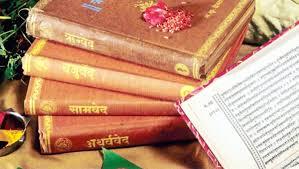The Vedas, the oldest sacred scriptures of Hinduism, mention several major deities and contain hymns dedicated to their worship. These deities hold significant importance in Hindu mythology and are revered for their various powers and attributes. Here are some of the major deities mentioned in the Vedas and their associated hymns:

Indra: Indra is one of the most prominent deities in the Rigveda, the oldest Veda. He is considered the king of gods and is associated with thunder, rain, and war. Many hymns in the Rigveda praise Indra for his strength, bravery, and role in battling evil forces. He is depicted as a warrior god who wields a thunderbolt and rides a celestial chariot.
Agni: Agni, the god of fire, plays a vital role in Vedic rituals and ceremonies. He is regarded as a messenger between the gods and humans, carrying offerings from the earthly realm to the divine realm. Numerous hymns in the Rigveda are dedicated to Agni, praising his purifying and transformative powers. Agni is often depicted as a radiant deity with three heads and seven tongues.
Varuna: Varuna is the Vedic god associated with the sky, water, and cosmic order. He is considered the upholder of moral and natural laws. Hymns in the Rigveda portray Varuna as a wise and just deity who punishes those who violate ethical principles. He is often depicted as a majestic figure riding a chariot and holding a noose, symbolizing his power of judgment.
Surya: Surya is the Vedic god of the sun and is highly revered for his role in providing light, warmth, and life to the world. Hymns dedicated to Surya in the Rigveda praise him as a radiant deity who dispels darkness and bestows blessings. Surya is depicted as a golden deity riding a chariot drawn by seven horses.
Usha: Usha is the Vedic goddess of dawn and symbolizes the arrival of light and new beginnings. Hymns dedicated to Usha in the Rigveda describe her as a beautiful goddess who awakens the world with her radiance. She is often depicted riding in a golden chariot and dispersing darkness with her rays.
Rudra: Rudra is a Vedic deity associated with storms, destruction, and healing. In later Hinduism, Rudra is considered an early form of Lord Shiva. Hymns in the Rigveda address Rudra as a fierce and powerful deity who possesses both destructive and benevolent qualities. He is often depicted as a hunter, armed with a bow and arrows.
Vayu: Vayu is the Vedic god of wind and represents the life-giving breath. Hymns dedicated to Vayu in the Rigveda highlight his role in spreading vitality and carrying the prayers of devotees to the gods. Vayu is often depicted as a swift deity riding a deer or an antelope.
Saraswati: Saraswati is the Vedic goddess of knowledge, wisdom, and the arts. She is revered as the patroness of learning and creativity. Saraswati is praised in hymns in the Rigveda for her blessings and inspiration. She is depicted as a serene and graceful deity playing the veena (a musical instrument) and adorned with white garments.